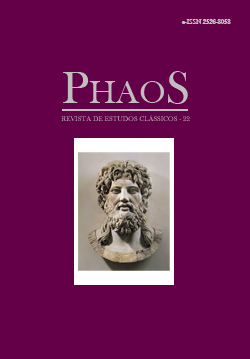Abstract
This paper aims to argue that the Apollo-Hades antithesis established in Stesichorus, fragment 271 (Davies & Finglass), when put in the context of its transmission source (Plutarch, On the E at Delphi), can admit a renewed meaning to the Plutarchian audience, namely, that Apollo and Hades are also opposed to each other considering that the former, as it is speculated, is a god associated with the sun, and the latter, as it is well known, is the god of the underworld – an unlikely meaning for the audience contemporary to Stesichorus. Therefore, we analyze the internal and external elements that constitute the opposition in the poem, and place them under Plutarch’s point of view. The analysis focuses on thematic and intertextual aspects, given the few verses that remain from the fragment. Thus, the paper intends to show how Apollo’s imagery as a sun god reinforces Plutarch’s thesis on the purity of Apollo, and establishes a new facet in opposition to Hades, although it has dubious bases according to Plutarch.
References
Fontes primárias
CAMPBELL, David. (ed., trad.). Greek lyric III. Stesichorus, Ibycus, Simonides, and others. Cambridge: University Press, 1991.
DAVIES, Malcom; FINGLASS, Patrick J. (eds., trads.). Stesichorus. The poems. Cambridge: University Press, 2014.
MOST, Glenn W. (ed.; transl.). Hesiod, Theogony. Works and days. Testimonia. Cambridge: Harvard University Press, 2006.
NAUCK, August. (ed.). Tragicorum Graecorum fragmenta. Hildesheim: Olms, 1964.
PATON, William R., et al. Plutarchus Moralia. III. Leipzig: Teubner, 2001.
BABBITT, Frank C. Plutarch: Moralia. V. Cambridge: Harvard University Press, 1936.
RAGUSA, Giuliana. (org., trad.). Lira grega. Antologia de poesia arcaica. São Paulo: Hedra, 2013.
WERNER, Christian. Homero, Ilíada. São Paulo: Ubu, 2018.
WERNER, Christian. Homero, Odisseia. São Paulo: Ubu, 2018.
WEST, Martin L. Homeri Ilias, vol. I-II. Munich, Leipzig: Saur, 1998-2000.
WEST, Martin L. Homeric hymns, Homeric apocrypha, lives of Homer. Cambridge: Harvard University Press, 2003.
WEST, Martin L. Homerus Odyssea. Berlin: De Gruyter, 2017.
Estudos
BERTANY, Edward. The best of the Olympians. The character of Apollo in the Homeric epics and hymns. 2018. 224 p. PhD thesis (Classics) – University of Washington, Seattle, 2018.
BURKERT, Walter. Greek religion. Archaic and Classical. Trad.: J. Raffan. Oxford: Blackwell, 1985.
CURRIE, Bruno; RUTHERFORD, Ian. (eds.). The reception of Greek lyric poetry in the ancient world. Transmission, canonization and paratext. Studies in archaic and classical Greek song, vol. 5. Leiden: Brill, 2020.
DETIENNE, Marcel. Apollon le couteau à la main. Une approche expérimentale du polythéisme grec. Paris: Gallimard, 2009 (1.ed.: 1998).
DOWDEN, Ken. Olympian gods, Olympian pantheon. In: OGDEN, Daniel. (ed.). A companion to Greek religion. Oxford: Blackwell, 2007.
FONTENROSE, Joseph E. Apollo and the Sun-God in Ovid. The American Journal of Philology, vol. 61, n. 4, 1940, p. 429-44. Disponível em: https://www.jstor.org/stable/291381. Acesso em 14 out. 2021.
GANTZ, Timothy. Early Greek myth. A guide to literary and artistic sources. Baltimore; London: Johns Hopkins University Press, 1993.
GRAF, Fritz. Apollo. London: Routledge, 2009.
HARDWICK, Lorna. Reception studies. Greece and Rome. New surveys in the classics, vol. 33. Oxford: University Press, 2003.
MARTINDALE, Charles; THOMAS, Richard F. (eds.). Classics and the uses of reception. Oxford: Blackwell, 2006.
MONBRUN, Philippe. Apollon: de l’arc à la lyre. In: BRULÉ, Pierre; VENDRIES, Christophe (eds.). Chanter les dieux. Musique et religion dans l’Antiquité grecque et romaine. Rennes: Presses Universitaires, 2001. p. 59-95.
NEER, Richard. Delphi, Olympia, and the art of politics. In: SHAPIRO, H. Alan (ed.). The Cambridge companion to archaic Greece. Cambridge: University Press, 2007. p. 225-64.
PARKER, Robert. Miasma. Pollution and purification in early Greek religion. Oxford: Clarendon Press, 1996. (1.ed.: 1983).
RABEL, Robert. Apollo as a model for Achilles in the Iliad. AJPh 111, n. 4, 1990. p. 429-40. Disponível em: https://www.jstor.org/stable/295239. Acesso em 14 out. 2021.
RUTHERFORD, Ian. Pindar’s paeans. A reading of the fragments with a survey of the genre. Oxford: University Press. 2001.
SILVA, Maria A. Plutarco e Delfos. Praesentia, vol. 13, 2012. Disponível em: http://erevistas.saber.ula.ve/index.php/praesentia/article/view/4233. Acesso em 14 out. 2021.
STADTER, Philip. Plutarch: diplomat for Delphi? In: BONS, Jeroen; KESSELS, Ton; SCHENKEVELD, Dirk; BLOIS, Lukas. (eds.). The statesman in Plutarch’s works. Vol. I: Plutarch’s statesman and his aftermath: political, philosophical, and literary aspects. Leiden: Brill, 2004. p. 19-31.
WILAMOWITZ-MOELLENDORFF, Ulrich von. Griechische verskunst. Berlin: Weidmann, 1921.
Obras de referência
CHANTRAINE, Pierre. Dictionnaire étymologique de la langue grecque. Histoire des mots. I-IV. Paris: Éditions Klincksieck, 1968-79.
LIDELL, Henry G.; SCOTT, Robert; JONES, Henry S. Greek-English lexicon with a revised supplement. 9ª ed. Oxford: Clarendon, 1996.

This work is licensed under a Creative Commons Attribution-NonCommercial-ShareAlike 4.0 International License.


